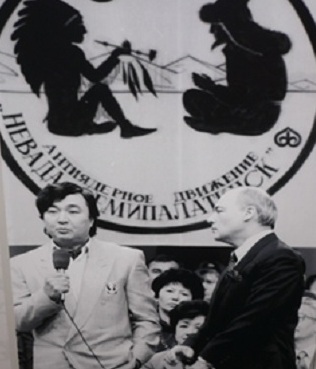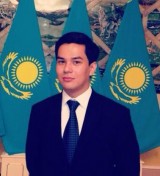During the time of the Soviet Union, Kazakhstan was perhaps the most nuclearised country in the world. It was the site of over 450 nuclear detonations (nuclear tests). Over 1200 Soviet nuclear weapons were deployed there.
The Kazakh people rose up together against the nuclear arms race and closed down the nuclear test site in August 1991, even before the country gained its independence from the USSR. Following indepedence, the Kazakhstan government, led by President Nazarbayev and supported by the population, rejected nuclear weapons, negotiated for the removal and destruction of all nuclear weapons in Kazakhstan, and negotiated the Central Europe Nuclear Weapon Free Zone.
Kazakhstan has launched a number of other initiatives for global nuclear disarmament including the UN International Day Against Nuclear Tests and the ATOM Project. The Basel Peace Office is cooperating with Kazakhstan on these initiatives.
Below is an article from Nurtas Janibekov, Senior Research fellow of the Analytical Complex of the Library of the President of Kazakhstan, on the Role of Kazakhstan in the Global Anti-nuclear movement.
*******************************************
THE ROLE OF KAZAKHSTAN IN THE GLOBAL ANTI-NUCLEAR MOVEMENT
Nurtas Janibekov
Senior Research fellow of the Analytical Complex of the Library of the President of Kazakhstan
Click here for a PDF version of the article
The current stage of international relations and world economic situation is going through a complex historical period. This period is especially difficult because of the new political and military conflicts around the world. Nonetheless, we should admit, that it could be much more dangerous and threatening for the globe secure, if the growth of the nuclear program was not stopped in the last century.
This year the world celebrates a very important date: 45th anniversary of the treaty on the Non-Proliferation of Nuclear Weapons, commonly known as the Non-Proliferation Treaty or NPT. As we know, the Treaty entered into force on March 5, 1970. Today, more than 190 states have joined the Treaty. NPT is important because their mission includes preventing the spread of nuclear weapons and weapons technology, promoting cooperation in the peaceful uses of nuclear energy, and achieving nuclear disarmament and general and complete disarmament, according to the UN official information.
However, the story of nuclear disarmament is not limited only by the activity of NPT. The world today knows how terrible and scary the consequences of the nuclear testing can be. Each nuclear testing left an unhealed scar on our Earth. One of the biggest such scars is situated in Kazakhstan: the Semipalatinsk Test Site or STS. It was the primary testing venue for the Soviet Union's nuclear weapons, located on the steppe in northeast of the country, not far from the Irtysh River and settlements.
According to the official information, the Soviet Union conducted 456 explosions between 1949 and the cessation of atomic testing in 1989. 456 explosions included 340 underground (borehole and tunnel) shots and 116 atmospheric (either air-drop or tower shots). The leadership of the country had a little regard for the effect on the local people or environment. Total capacity of damage after these explosions was more than 2,500 bombs dropped on Hiroshima. We know that because the information about full impact of radiation exposure and nuclear explosions came out only after the closing of the test site in 1991.

Kazakh poet Olzhas Suleimenov speaking in front of a label of the ‘Nevada-Semipalatinsk’ anti-nuclear movement.
The closing of the test site in Semipalatinsk was an extremely important event not only for Kazakhstan, but for the whole Central Asia region and the anti-nuclear movement around the globe. The greatest contribution in closing of the STS came from the First President of Kazakhstan – Nursultan Nazarbayev and the Anti-nuclear movement in Kazakhstan, "Nevada Semipalatinsk", formed in 1989. This movement was one of the first and biggest major anti-nuclear movements in history. One of the leaders of this movement was renowned poet Olzhas Suleimenov, who was also a deputy (senator) during that time.
The sad experience of Kazakhstan and the radioactive after-effect, which had direct impact on the health of about 200,000 local residents, showed the world the true danger of the nuclear testing. The positive role of Nursultan Nazarbayev in promoting the global understanding of the necessity to fight against nuclear threats appeared in his decision to refuse the status of the nuclear superpower. Due to the political will of the President of Kazakhstan, the country voluntarily renounced the world’s fourth largest nuclear potential, inherited from the Soviet military machine. According to the words of Nursultan Nazarbayev, it was more than 110 ballistic missiles with 1200 nuclear warheads, able to reach any point on the earth.

President Nursultan Nazarbayev launching the ATOM Project at the 2012 Assembly of Parliamentarians for Nuclear Non-proliferation and Disarmament
This decision was historically important and right. It is also very important, because Kazakhstan is the second largest possessor of uranium reserves in the world and ranks first in its production. In his speech, President mentioned, that the closure of the Semipalatinsk test site launched a new stage of the global nuclear non-proliferation and disarmament process. Later, in September 2006 in cooperation with the United States and Russia, Kazakhstan together with other countries signed the Semipalatinsk Treaty, which declared Central Asia a nuclear-free zone.
The world today should not underestimate the real level of the nuclear threat. Another initiative of the Kazakhstan’s President of promoting the anti-nuclear movement around the world was the launching of the ATOM Project (stands for “Abolish Testing Our Mission”) at a parliamentary assembly in Astana on August 29, 2012, the UN International Day Against Nuclear Tests. With such projects people would be able to support the anti-nuclear movements. Also they will help to build a global support for a permanent end to nuclear weapons testing and even the total abolition of nuclear weapons through peaceful methods.

Karipbek Kuyukov, Honorary Ambassador of the ATOM Project, has no arms (due to impact of nuclear tests) but ‘Waves goodbye to nuclear weapons’ as part of Global Wave 2015
Today people from all over the world have another chance to support the Anti-Nuclear movement: to participate in Global Wave 2015 on April 26-27. This action will unite young people, activists, celebrities, stars, political and religious leaders and other active representatives of the globe society. One of the most important ideas of the anti-nuclear movement is defending and promoting the Nuclear-Free World. The Nuclear-Free World – is a common goal to which all countries in the world should strive.
The experience of Kazakhstan showed the world, that the nuclear or any other military power is not determinant in the foreign policy. Today we understand the true meaning of the words of the President of Kazakhstan, that only by acting together, we can make our world a safer and better place to live.
